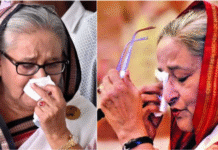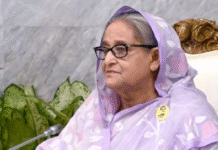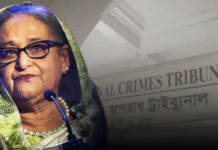The Daily Star

The ruling Awami League finds itself in a strange predicament over local body polls.
In most places where rebel candidates do not withdraw from the race, intraparty feud takes the centre stage and where the party manages to field single candidates, they win uncontested, a practice for which the government has been drawing flak from different quarters.
The AL has expelled dissidents for violating “party discipline” after they contested elections against candidates nominated by the party. The AL high-ups expelled the leaders without even serving them with any show-cause notices. They also warned of not giving them any party nomination or portfolio in future.
But nothing seems to work. Rebels keep contesting the polls.
In the meantime, AL leaders running against the party’s very own symbol is creating division among the grassroots leaders which is ultimately weakening its organisational strength, something that concerns the party as the national election is approaching, said AL insiders.
The insiders also said the AL-led government wants to avoid uncontested elections because those invite criticism.
Experts and right bodies have recently slammed such polls saying this trend will leave a long-term negative impact on the country’s democracy.
In a statement on Tuesday, Ain o Salish Kendra (ASK) said people’s right to choose their representatives by casting votes has been curtailed and many “qualified” candidates have lost interest in taking part because of the trend of winning elections uncontested.
“It is an ominous sign for democracy,” ASK said in the statement.
Yesterday, Election Commissioner Mahbub Talukdar said in a multi-party democracy, it was expected that multiple political parties would join polls.
“Finding out why competition is missing from elections and taking required steps to overcome it is extremely essential. Voters’ apathy towards election is an ominous sign for democracy,” he said.
In Monday’s election to 160 union parishads, 43 chairman candidates were elected uncontested, which means around 29 percent contestants were elected without even getting a single vote.
It was the second and final part of the first phase of the UP polls. Results of four UP polls were withheld.
Independent chairman aspirants sealed victory in 36 unions, meaning they constituted 29 percent of the winning candidates in 113 unions, where poll results were available. Results in the rest four unions were suspended for various reasons, including violence.
Most of the victorious independent candidates were AL rebels.
AL insiders think giving party nomination to the wrong candidates, internal feud and a lack of chain of command in the party grassroots are the main reasons why many leaders were contesting the polls ignoring the party’s decision.
And those rebels gave AL candidates a tough time on Monday although no candidates were fielded by other major political parties like the BNP, they said.
AL Joint General Secretary Mahbubul Alam Hanif, however, thinks the dissidents were not a “big headache” for his party.
“Earlier, local government polls were not held in partisan manner. The partisan polls were introduced for the local government bodies in 2015 and many grassroots leaders have not yet become habituated with the new system. It will take some time,” he told The Daily Star.
“But our party’s tough stance against party rebels will remain the same in future,” he warned.
Asked why many of the rebels were winning, the AL leader said, “They got votes of those who are against the ruling party. A section of Awami League’s votes also went into their bags as those were cast by the supporters of the rebel candidates.”
On June 21, 204 union parishads went to polls in the first part of the UP polls’ first phase. Forty-nine independent chairman candidates, mostly AL rebels, won while 28 were elected unopposed.
AL rebels proved their worth in some places in that election.
Take the example of Khulna’s Dighalia. AL dissidents secured victory in five of the six UPs in the upazila. The party candidate won only in Barakpur union.
In Dighalia union, the AL candidate secured the third spot bagging 3,965 votes. AL dissident Haider Ali Morol got 6,082 votes while another rebel bagged 4,849 votes.
In Gazirhut UP, AL candidate Kamal Uddin Siddique bagged 4,745 votes while AL rebel Mofizul Islam got 4,900 votes.
In Arongghata UP, AL candidate Mofizur Rahman got 2,896 votes while AL dissident Farid Akter got 3,453 votes. In Senhati UP, AL candidate Farzana Naznin got 6,395 votes while AL rebel bagged almost double votes — 11,674.
AL candidate Gazi Zakir Hossain secured 6,903 votes in Barakpur UP polls while party dissident Sheikh Ansar Uddin bagged 5,915 votes.
The highest number of independent candidates winning was from Satkhira. They won in 11 UPs while AL candidates in nine unions under two upazilas.
Of the 11 independents, six were leaders from the AL, three from the BNP, one was from Jamaat-e-Islami and the other from Workers Party.
In Cox’s Bazar, elections to 14 unions were held and results in two others were withheld. AL candidates won in six UPs, party rebels sealed victory in two while the other four chairman posts were won by leaders from the BNP.
Voting in 13 UPs in Subarnachar and Hatiya upazilas under Noakhali were held where nine AL candidates won while AL dissidents got elected in four.
In Bagerhat, voting was held in 65 UPs and 38 AL nominees won unopposed. Twenty-five AL candidates won while AL dissidents were elected as chairman in two unions.
In Chattogram, election to 12 UPs under Sandwip upazila was held. AL candidates won in 10 UPs while party rebels were elected in two, show polls results.


 For all latest news, follow The Daily Star’s Google News channel.
For all latest news, follow The Daily Star’s Google News channel. 







